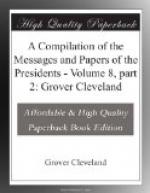To this end the President directs that the Treasury Department and its dependencies in this capital shall be draped in mourning for a period of thirty days, the several Executive Departments shall be closed on the day of the funeral of the deceased, and that on all public buildings of the Government throughout the United States the national flag shall be draped in mourning and displayed at half-mast.
I have the honor to be, sir, your obedient servant,
FREDK. T. FRELINGHUYSEN.
[Footnote 19: Addressed to the heads of the Executive Departments, etc.]
In the exercise of the power vested in the President by the Constitution, and by virtue of the seventeen hundred and fifty-third section of the Revised Statutes and of the civil-service act approved January 16, 1883, the following rule for the regulation and improvement of the executive civil service is hereby amended and promulgated:
RULE XIX.
There are excepted from examination the following: (i) The confidential clerk or secretary of any head of Department or office; (2) cashiers of collectors; (3) cashiers of postmasters; (4) superintendents of money-order divisions in post-offices; (5) the direct custodians of money for whose fidelity another officer is under official bond and disbursing officers having the custody of money who give bonds, but these exceptions shall not extend to any official below the grade of assistant cashier or teller; (6) persons employed exclusively in the secret service of the Government, or as translators or interpreters or stenographers; (7) persons whose employment is exclusively professional; (8) chief clerks, deputy collectors, and superintendents, or chiefs of divisions and bureaus. But no person so excepted shall be either transferred, appointed, or promoted, unless to some excepted place, without an examination under the Commission. Promotions may be made without examination in offices where examinations for promotion are not now held until rules on this subject shall be promulgated.
Approved, November 10, 1884.
CHESTER A. ARTHUR.
FOURTH ANNUAL MESSAGE.
WASHINGTON, December 1, 1884.
To the Congress of the United States:
Since the close of your last session the American people, in the exercise of their highest right of suffrage, have chosen their Chief Magistrate for the four years ensuing.
When it is remembered that at no period in the country’s history has the long political contest which customarily precedes the day of the national election been waged with greater fervor and intensity, it is a subject of general congratulation that after the controversy at the polls was over, and while the slight preponderance by which the issue had been determined was as yet unascertained, the public peace suffered no disturbance, but the people everywhere patiently and quietly awaited the result.




